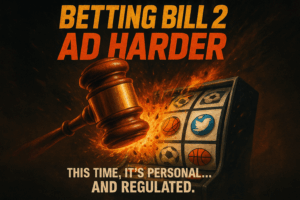In this week’s edition of the GME3, we’re looking at an announcement from the AGCO pressuring media outlets to stop carrying ads for unlicensed gaming sites, a $1.4 billion fine levied against Google in Texas over privacy violations, and the dismissal of the head of the U.S. Copyright Office, only days after her office released a report raising concerns about the use of copyrighted materials to train AI models. Read the full stories below!
Gambling
No Ad-Vantage for Bodog
Ontario’s Alcohol and Gaming Commission (AGCO) is pressuring more than a dozen traditional and digital media outlets to stop carrying ads for unlicensed gambling sites, singling out offshore operator Bodog as a prime offender. The regulator says media promotion lends “a veneer of legitimacy” to operators that target Ontarians without a provincial licence, noting Bodog still markets actively in Ontario even after cutting off Québec and Nova Scotia players. AGCO CEO Dr. Karin Schnarr urged outlets to demonstrate social responsibility by refusing such advertising altogether.
Consumer awareness surrounding these unregulated, offshore sites remains murky. Industry surveys cited at last year’s Canadian Gaming Summit found many bettors still struggle to distinguish between legal and illegal sites, and fresh Ipsos research for iGaming Ontario shows that 16.3 percent of provincial gamblers use only unregulated websites, while another 20.2 percent of those who play on licensed platforms also wager offshore. AGCO COO Dave Phillips told the IMGL conference in April that, although the regulator aims to “remove the oxygen” from grey-market operators, it lacks sweeping enforcement powers and is developing a broader strategy with domestic and international partners.
Bodog also faces mounting legal troubles. In January, Manitoba Liquor & Lotteries, on behalf of the Canadian Lottery Coalition, filed for an injunction accusing Bodog of misleading Canadians by portraying itself as a trustworthy national brand; a court hearing is set for May 26. AGCO’s public call-out reinforces that pressure, signalling a coordinated push by regulators and lotteries to starve unlicensed operators of advertising reach and market share.
Media
Big Tech: Bigger Fine
Google has agreed to pay $1.4 billion to settle two lawsuits brought by the State of Texas over allegations it violated residents’ privacy rights. The suits, filed in 2022 by Texas Attorney General Ken Paxton, accused Google of improperly collecting location data, search histories, and biometric information such as facial recognition and voice data. The settlement mirrors a similar $1.4 billion deal Paxton secured from Meta last year over unlawful facial recognition tagging.
The lawsuits cited violations of Texas’s Capture or Use of Biometric Identifier Act, which requires companies to obtain user consent before using biometric technologies. Allegedly affected products included Google Photos, which allows facial search; Nest cameras, which identify visitors; and Google Assistant, which stores voice profiles. A separate suit under Texas’s Deceptive Trade Practices Act claimed that Google tracked users’ locations despite settings meant to disable that function and misrepresented the privacy of its Incognito browsing mode.
Google stated that it has already updated its policies and that the settlement addresses outdated claims. Still, the case underscores growing state-level efforts to hold tech companies accountable in the absence of comprehensive federal privacy laws. Texas’s ability to impose fines of up to $25,000 per biometric violation makes it a powerful enforcer in the escalating battle over data privacy.
Entertainment
Copyright Coup
The Trump administration has dismissed Shira Perlmutter, the head of the U.S. Copyright Office, shortly after the release of a significant government report on artificial intelligence and copyright. Perlmutter, who had served as Register of Copyrights since 2020, was removed just days after her office published the third installment of an in-depth report exploring the complex relationship between AI technologies and copyright protections. The report raised questions about the necessity and legal implications of using large volumes of copyrighted material to train AI models, noting ongoing debate about the value of increasing data for improving real-world AI performance.
Perlmutter’s firing followed the dismissal of her appointing authority, Librarian of Congress Carla Hayden, who was also removed by President Trump just one day earlier. The dual firings have sparked criticism and concerns over political interference in independent agencies.
Representative Joe Morelle, ranking Democrat on the House Administration Committee, condemned the move as a “brazen, unprecedented power grab with no legal basis,” and suggested it may have been retaliatory. He cited the Copyright Office’s resistance to endorsing Elon Musk’s reported efforts to mine copyrighted content for AI training – a practice under scrutiny in the latest report.
Meanwhile, Trump has continued to champion AI development. His administration recently announced a public-private initiative involving OpenAI, SoftBank, and Oracle, pledging up to $500 billion in investment for U.S.-based AI infrastructure.
The U.S. Copyright Office, which operates under the Library of Congress, plays a critical role in copyright registration and enforcement, and the firings raise concerns about the future of independent oversight in the evolving intersection of AI and intellectual property.
GME Law is Jack Tadman, Lindsay Anderson, and Will Sarwer-Foner Androsoff. Jack’s practice has focused exclusively on gaming law since he was an articling student in 2010, acting for the usual players in the gaming and quasi-gaming space. Lindsay brings her experience as a negotiator and contracts attorney, specializing in commercial technology, SaaS services, and data privacy.
At our firm, we are enthusiastic about aiding players in the gaming space, including sports leagues, media companies, advertisers, and more. Our specialized knowledge in these industries allows us to provide tailored solutions to our clients’ unique legal needs. Reach out to us HERE or contact Jack directly at jack@gmelawyers.com if you want to learn more!
Check out some of our previous editions of the GME3 HERE and HERE, and be sure to follow us on LinkedIn to be notified of new posts, keep up to date with industry news, and more!




